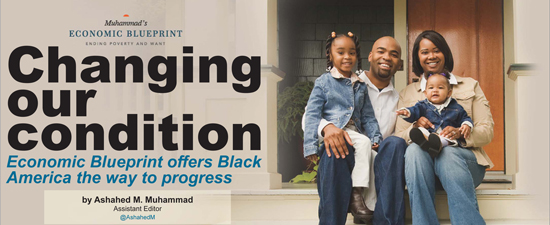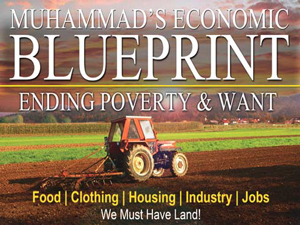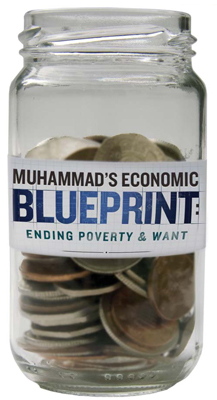Economic Blueprint offers Black America the way to progress
By Ashahed M. Muhammad -Assistant Editor- | Last updated: Nov 5, 2013 - 8:55:28 AMWhat's your opinion on this article?
‘Since our being brought in chains to the shores of America, our brain power, labor, skills, talent and wealth have been taken, given and spent toward building and adding to the civilization of another people.’

From ‘Message to the Blackman in America’ by the Most Honorable Elijah Muhammad
Pooling resources to achieve a common goal is a universal concept that makes a lot of sense. The concept has been espoused by many, practiced by some, and makes Muhammad’s Economic Blueprint critical for survival today. Why? Analysts say the wealthy elites and politically powerful have forgotten about Black America, and the poor in the United States.
“I think that it is time for people to realize that the people that run the country have really abandoned us and unless we start to taking matters into our own hands—and I’m not talking about taking up arms—unless we start taking matters into our own hands and start to do for ourselves collectively, then I think we’re going to be lost,” said Michael Yates, an economist, labor educator, and associate editor of the Monthly Review magazine.
Mr. Yates was one of several economic professionals representing various schools of thought and ethnic backgrounds, who met with the Honorable Minister Louis Farrakhan in Phoenix, Arizona in the early part of 2013 to discuss Muhammad’s Economic Blueprint. The Blueprint calls on 16 million Black wage earners to give 35 cents a week to a national treasury. In one year the fund would amass $291 million to be invested first in farmland and then in other industries and projects. (Visit economicblueprint.org for more information.)
Black America suffers poverty and want

|
Statistics don’t tell the full story, however, they can’t be ignored.
The most recent U.S. Census found median Black household income to be $33,321, much lower than White median household income which stands at $57,009. Over one-fourth of Blacks, (27.2 percent) live in poverty compared to 9.7 percent of Whites. Of that group of Blacks in poverty, 12.7 percent live in a condition referred to as deep poverty, defined as earning less than 50 percent of the federal poverty threshold.
According to the most recent data available from the United States Department of Agriculture, 15 percent of the American population or 47.8 million people, are participating in the Supplemental Nutrition Assistant Program (SNAP), each receiving an average of $133 per month.
Although that number seems large, according to Feeding America, a nationwide advocacy group working for food security and fighting hunger for all Americans, many who participate in SNAP are still forced to turn to food banks to fill their nutritional needs since what they receive amounts to less than a $1.50 per person, per meal.In several states, Georgia, Kentucky, Louisiana, New Mexico, Oregon, and Tennessee, the percentage of the population using SNAP is over 20 percent. The average gross monthly income for households participating in SNAP is $731with the average net income being $336.
Thirty-seven percent of those participating in SNAP are White, 22 percent Black, 10 percent Latino, 4 percent Native American and 2 percent Asian. A remaining 19 percent of SNAP participants are of unknown race or ethnicity.
While statistics show there are many of all races and ethnicities in need of crisis level intervention and assistance, the Black condition is especially dreadful.

“Anyone who receives a wage or allowance of some kind, or who simply looks down on the street and finds coins is capable of giving 5 cents a day and 35 cents a week. It is perhaps the most beautiful aspect of what the Honorable Minister Louis Farrakhan is asking us to do.” —Economist and political analyst Cedric Muhammad |
How legacy of slavery haunts Black economics
Economist and political analyst Cedric Muhammad believes slavery did something to Blacks that was not done to any other people as it relates to the prevention of the establishment of a savings tradition, which subsequently resulted in the lack of generational wealth.
“Slavery robbed us of a cultural savings tradition which we could practice on a mass level. You will find the ‘gae’ executed among the Koreans; ‘susu’ among West Africans; ‘partners’ among Jamaicans; ‘ekoub’ among Ethiopians and Eritreans; ‘hui’ among the Chinese and ‘kenjinkai’ in Japanese culture—all of which channel pools of savings into essential economic activities like investment and charity,” said Mr. Muhammad. “Though we had mutual aid societies, fraternal orders and churches during and after slavery which provided assistance to widows and children and even led to the creation of banks, Black Americans have never had an informal cultural tradition to build upon like these, which reinforced the importance of savings and investment and which connected wage earners, entire families, whole neighborhoods and business networks.”
Minister Farrakhan has also repeatedly spoken about the evils of the sharecropping system which kept Blacks who worked in the field during slavery in a state of perpetual debt.
Cedric Muhammad said it was fitting that the Economic Blueprint was launched in Tuskegee, Alabama, the town made famous by Booker T. Washington who through his establishment of the National Negro Business League and his work at Tuskegee Institute (later to become Tuskegee University) identified and implemented effective ways to merge the entrepreneurial class with the agrarian class in moving towards economic progress. Land as a central focus of the Economic Blueprint is key, he noted.
“The focus of the strategy on physical capital has been land ownership and through policy and culture, to disconnect us from farming and agriculture. That dealt two fatal blows because without land you cannot have an economic system and without farming you cannot control the quality of what is designed to nourish you. No people can survive or prosper who do not own what is under their feet or control what goes into their mouths. So despite our progress in politics our employment, wealth and health disparities remain,” said Mr. Muhammad.
Mr. Yates agrees with the Nation of Islam’s heavy emphasis on land acquisition as the logical first step in the strategy after pooling economic resources.
“I think that’s an important issue, the German playwright Bertolt Brecht said ‘first feed the people.’ Before anything don’t talk to me about high-minded notions until people get fed, and how are you going to feed people in a society like this? First of all a lot of people don’t know how to access the food of any quality. A lot of people are too poor to feed their families even in this richest country in the world. And then a lot of the food that we get is contaminated in one way or another,” said Mr. Yates. “I think land to produce food first and there’s other things you can do with land of course, but I think food production would really be critical,” he added.
Another reason the economic resources of the Black community—though substantial—appear to lack the same power as the dollars that flow within other communities has been the various strategies to generate income and wealth, which are not sustainable.
Doing for self: The way to success

|
Mr. Bowlds grew up as a member of the Nation of Islam in the 60s, implementing the “Do for Self” principles made famous by the Most Honorable Elijah Muhammad.
The economic principle of supply and demand and survival are universal principles, said Mr. Bowlds, however, for too long, the Black community has used only the temporary fix of having a job and only poor strategies and techniques to generate income.
“A job does not have any transferrable wealth,” Mr. Bowlds continued, “If I get fired, terminated or laid off, that’s it!”
Since Blacks are typically the “last hired and first fired,” being tied to a job provides only a temporary economic remedy. As an example of a poor model to generate income, Mr. Bowlds mentioned multilevel marketing, which he describes as “nothing but a scourge” in Black communities.
“We have to create a system that accommodates the process of meeting our economic disparities. You’re not going to find that in Harvard Business School,” said Mr. Bowlds. “Their teachings are designed to empower them and to perpetuate their interests,” he added.
Black entrepreneurs and others working to shift the Black community’s business paradigm and generate wealth must learn from the mistakes of the past, which means connecting the entrepreneurial spirit to the consumer needs and demands of the Black community, said Mr. Bowlds.
“We build things and then we invite others in that don’t have our best interests at heart. Every system that we built for self-reliance was infiltrated and eventually was destroyed,” Mr. Bowlds noted.
Cedric Muhammad believes if implemented properly, the Economic Blueprint “in one fell swoop would introduce a savings tradition into the lifeblood of the entire mass body.” Blacks can make a cultural shift that will provide a mechanism for meeting financial needs and achieving financial aspirations, he said.
“Anyone who receives a wage or allowance of some kind, or who simply looks down on the street and finds coins is capable of giving 5 cents a day and 35 cents a week. It is perhaps the most beautiful aspect of what the Honorable Minister Louis Farrakhan is asking us to do: the Economic Blueprint is totally inclusive, regardless to class, gender, status or region—it leaves none of our 42 million behind,” said Mr. Muhammad.
(For more information regarding Muhammad’s Economic Blueprint or to make your contribution, go to http://www.EconomicBlueprint.org.)
INSIDE STORIES AND REVIEWS
-
-
About Harriett ... and the Negro Hollywood Road Show
By Rabiah Muhammad, Guest Columnist » Full Story -
Skepticism greets Jay-Z, NFL talk of inspiring change
By Bryan 18X Crawford and Richard B. Muhammad The Final Call Newspaper @TheFinalCall » Full Story -
The painful problem of Black girls and suicide
By Charlene Muhammad -National Correspondent- » Full Story -
Exploitation of Innocence - Report: Perceptions, policies hurting Black girls
By Charlene Muhammad -National Correspondent- » Full Story -
Big Ballin: Big ideas fuel a father’s Big Baller Brand and brash business sense
By Bryan Crawford -Contributing Writer- » Full Story






 Click Here Stay Connected!
Click Here Stay Connected!








